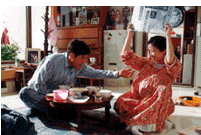 |
|
 |
 |
 |
 |
 |
 |
 |
 |
 |
 |
 |
 |
 |
1999 / South Korea-Japan / Color / 135min.
* 2000 Cannes Film Festival Direstors' Fortnight
* Karlovy Vary International Film Festival Special Prize of the Jury, FICC Don Quijote Award and Netpac Award Special Mention
|
 |
|
 |
[SYNOPSIS]
Time is spring, 1999. A group of former factory workers have gathered to have a picnic on a riverbank. They are here to reminisce about another picnic that held by the same members at the very spot twenty years ago.
Now in their forties, they are enjoying themselves drinking and singing along with the portable karaoke. Then, out of the blue, Kim Yongho, who has been out of touch for a long while, shows up wearing a suit peculiarly overdressed for the occasion. He is short of words in spite of the long separation. He suddenly grabs the microphone and starts to sing his heart out. Then he goes off to climb up a rail bridge and he stands there stone still in spite of the whistle of an approaching train. And there he is, in the middle of the bridge while the memories of his past come flooding back, each one quickly replaced by the memory of the event that took place earlier.
He is taken back to a few days earlier. He sees himself, a desperate man who has just lost his business and is separated from his wife and child. The man accidentally meets up with his long lost first love, Sunim, but it only compounds on his misery.
He is then taken back to five years earlier when his business was booming and he had just moved into a new luxurious house. And then onto six years before that...then three years before that...there was a time when his wife cheated on him and there was a time he indulged in his own adultery.
Then there was a time when he was a detective. He treated Sunim coldly in spite of his feeling for her. She would always enclose a peppermint candy in her letters to him.
Finally his mind goes back to twenty years ago, to the day of the picnic when his heart collided with Sunim's heart for the first time. The two young lovers were full of hope for their future; they truly believed that life was beautiful. Oh, how far, how painfully far away that day seems now.
Meanwhile in reality, the train closes in on him...
[COMMENTARY]
PEPPERMINT CANDY is Lee Chang-Dong's second feature film, following his widely acclaimed debut film, GREEN FISH (Vancouver, Pusan).
PEPPERMINT CANDY is the story of Kim Yongho, a 40 year-old man, in despair over his life, who travels back in his mind, through his adult life.
Lee portrays Kim's backward voyage through time, skillfully interweaving the twin devices of photographs and train travel. In his youth, Kim Yongho had aspired to become a photographer. For Kim, now in his middle-age, photography has come to embody the profound human desire to capture and preserve forever, the human experience of time and life's precious fleeting moments.
Spliced between the seven chapters of the film are images of a rail train, traveling swiftly over wide open plains. Traveling alongside the train, but in the opposite direction are birds and other vehicles. In Lee's phrase, "forward into the past," Kim's journey is not so much a return to the past, as a headlong search for the forces which backed him into the morass he now founders in.
The twenty years of Kim's travels coincide with the history of Korea's modernization. The film boldly portrays the notorious Kwangiu Massacre (1980), the single event seared into the memory of every Korean of a certain generation. As an innocent young man drafted into the Korean Army, Yongho found himself participating in the Massacre, ultimately shooting a young girl dead. The unshakable trauma of Kim's participation in the Massacre has plagued his life.
Sol Kyung-Gu, who plays Kim Yongho, was also featured in RAINBOW TROUT, THE BIRD WHO STOPS IN THIN AIR and PHANTOM, THE SUBMARINE.
His four films, including PEPPERMINT CANDY, were showcased in this year's Pusan International Film Festival, spotlighting Sol Kyung-Gu, as Korea's most promising young actor after Han Suk-Gyu, who established his name in Korea in CHRISTMAS IN AUGUST and SHURI. Sol's identification with the character of Kim Yongho is so complete that his furiously compelling performance explodes the boundaries of mere acting. Sol was so drained by acting the part of the central character that he later referred to PEPPERMINT CANDY "as a movie I would rather not remember too much."
Producer, Myung Kaynam, is one of Korea's best supporting actors. In GREEN FISH, he played the role of a gang boss who comes to blows against another gang boss, played by Han Suk-Gyu . He is also a leading force in the "Screen Quota System Preservation Campaign," which is tackling the biggest problem currently the Korean film industry is facing. |
 |
by Shigemi MIHARA
|
The Message from the director :
In my film project PEPPERMINT CANDY, I see the waves of time flowing in reverse, back to the past. What is the nature of the times that other Koreans and I have passed through? I decided to go back to find a twenty-year old youth in my search for answers to such questions, taking off the shell of time, and removing the dirty patina of time. Going back in time is not for reasons of sentimental nostalgia, nor is it the tendency to place more importance on the past over the present. I wish this to be a chance for the young people of today to find identification with the young people of the past, and perhaps gain some wisdom from us who have lived a little longer than they have. It is my earnest wish that the young people of today can relate to purity and innocence of young people in past as depicted in the last scene of the film. |
 |
 |
 |
 |
|
Lee Chang-Dong, director :
Born in Taegu in 1954, he graduated from Kyongbuk University with degree in Korean Literature. He taught from 1981 to 1987. His first novel, JUNLI, won the Donga Iibo New Spring Literary Prize in 1983. In 1987 he published works such as POSSESSION, CHINGI, STRING until his ABOUT FATE had made it to the final list of the Lee Sang Literary Award. In 1992, he published another novel THERE'S A LOT OF SHIT IN NOKCHEON. In 1993, he won the 25th Hankook Libo Award. He wrote his first script, TO THE STARRY ISLAND, by the request of his friend Park Kwang-Soo and joined the set as an assistant director. He wrote a screenplay, THE SINGLE SPARK in 1995. He wrote the movie, GREEN FISH in 1996. He founded East Film Company with actors like Moon Seong-Keun and Myung Kaynam, and a director Yeo Kyun-Dong. He made his directorial debut in GREEN FISH, the first production by East Film Company. The film was screened in February, 1997 and garnered the 33rd Baeksang Arts Award for Best New Director, Best Screenplay, the 17th Film Critics' Award for Best New Director, the 35th Daejong Film Festival Special Jury Award / Best Screenplay, the 18th Blue Dragon Award for Best Director, and the Alkan Dragons & Tigers Award for Young Cinema at the 16th Vancouver Film Festival. In 1998, he won Cine 21's Film Award for Best Director while actively working as a spokesperson for "Domestic Film Allocation Supervising Committee." In 1999, he takes on the leading role in an investment company with the aim to promote films called Uni Korea Art Investment Company.
Staff :
Director / Screenwriter : Lee Chang-Dong
Producer : Myung Kaynam, Makoto Ueda (NHK)
Co-Producer : Jeon Jae-Yong, Jay Jeon, Keiko Iino (NHK ENTERPRISES 21,INC)
Director of Photography : Kim Hyung-Koo
Lighting Designer : Lee Kang-San
Production Designer : Park ll-Hyun
Music Director : Lee Jae-Jin
Cast :
Yongho : Sol Kyung-Gu
Sunim : Moon So-Ri
Hongia : Kim Yeo-Jin
|
|
|





